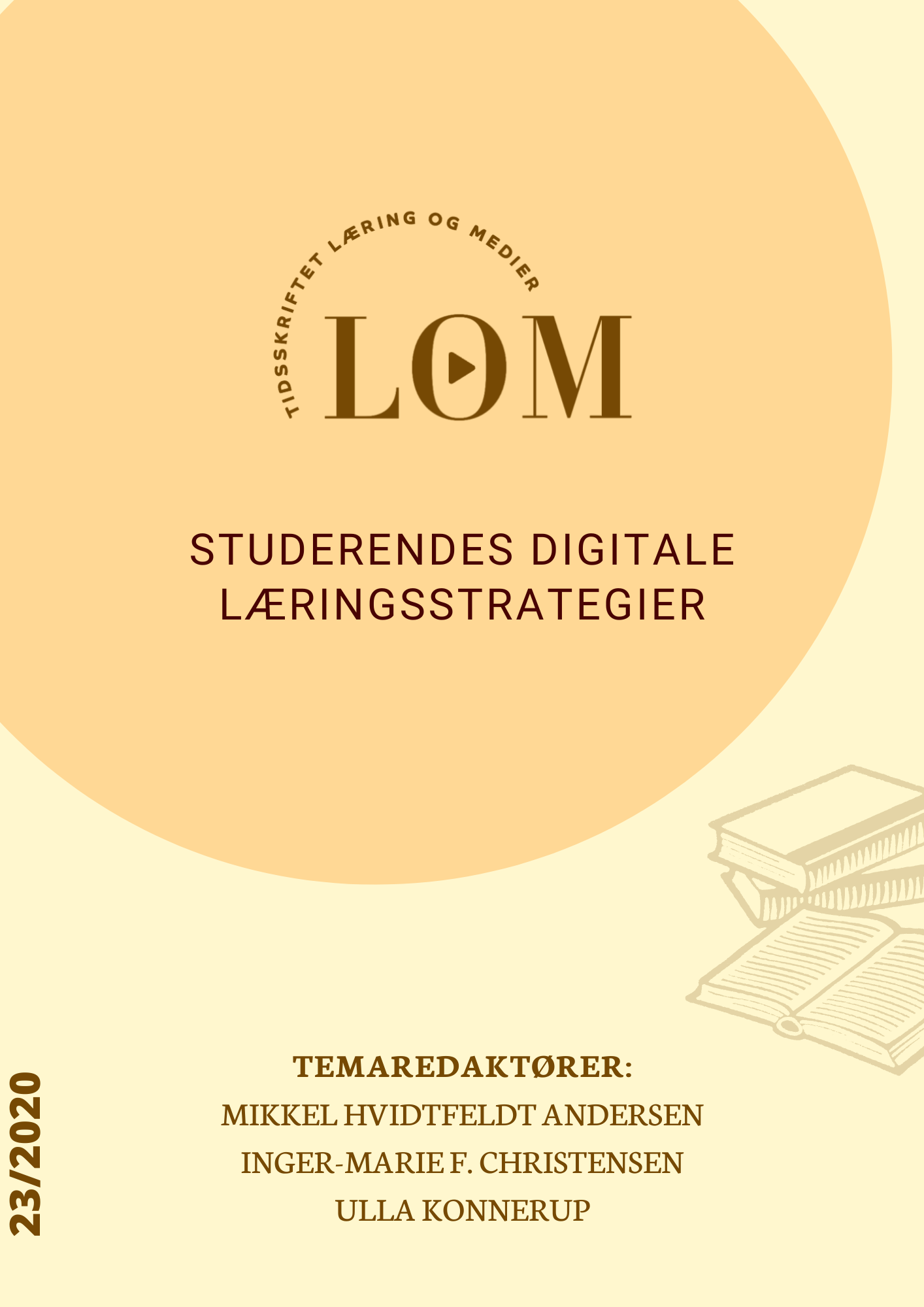Digitaliserede læringsfællesskaber – netstuderende og deres studiestrategier
DOI:
https://doi.org/10.7146/lom.v13i23.122033Keywords:
Netbaseret undervisning, online undervisning, læringsfællesskaber, studiestrategier, etnografiAbstract
This article is based on ethnographic studies following an internet-based online nursing educational program. The article focuses on how online students develop strategies to handle a new online learning context. The empirical background consists of empirical data from observations and interviews conducted in students' homes. The students have been followed through a period of two years.
The ethnographic studies and subsequent analyzes show how the online education's e-pedagogical design contributes to the development of active and independent students. However, the e-pedagogical design does not in itself ensure academic success. Rather, the success seems to be ensured through the online students' self-managed development of the study groups into digitized learning communities. The digitized learning communities demand self-management of the learning environment and of the necessary technology acquisition, as well as the ability to be challenged and to challenge fellow students academically in the online learning context. Finally, the article discusses what the introduction of digital learning courses, in otherwise campus-based educations, means in terms of students' learning outcomes
Downloads
References
Allan, H. T., O’Driscoll, M., Simpson, V., & Shawe, J. (2013). Teachers’ views of using e-learning for non-traditional students in higher education across three disciplines [nursing, chemistry and management] at a time of massification and increased diversity in higher education. Nurse Education Today, 33(9), 1068–1073.
Atkinson, P. (2015). For ethnography. SAGE.
Borgnakke, K. (1996). Procesanalytisk teori og metode. Thesis, Danmarks Universitetsforlag.
Borgnakke, K. (2008). Evalueringsstrategier—I den pædagogiske kontekst. I K. Borgnakke (Red.), Evalueringens spændingsfelter (s. 9–66). Klim.
Borgnakke, K. (2018). Cardinal Writing: Following the observed process. I B. Jeffrey & L. Russell (Red.), Ethnographic writing (s. 45–65). E & E Publishing.
Borgnakke, K. (2019). Ethnographic Methods for Researching Online Learning and E-Pedagogy. Oxford University Press. https://doi.org/10.1093/acrefore/9780190264093.013.542
Button, D., Harrington, A., & Belan, I. (2014). E-learning & information communication technology (ICT) in nursing education: A review of the literature. Nurse Education Today, 34(10), 1311–1323. https://doi.org/10.1016/j.nedt.2013.05.002
McCutcheon, K., Lohan, M., Traynor, M., & Martin, D. (2015). A systematic review evaluating the impact of online or blended learning vs. Face-to-face learning of clinical skills in undergraduate nurse education. Journal of Advanced Nursing, 71(2), 255–270. https://doi.org/10.1111/jan.12509
McIntyre, M., McDonald, C., & Racine, L. (2013). A critical analysis of online nursing education: Balancing optimistic and cautionary perspectives. The Canadian Journal of Nursing Research = Revue Canadienne De Recherche En Sciences Infirmieres, 45(1), 36–53.
Olesen, M. I. K. (2020). Jeg vil have rigtig undervisning! Profiler af blendede learnere i efter- og videreuddannelsen. Tidsskriftet Læring & Medier, 12(22).
Parker Webster, J., & Marques da Silva, S. (2013). Doing educational ethnography in an online world: Methodological challenges, choices and innovations. Ethnography and Education, 8(2), 123–130. https://doi.org/10.1080/17457823.2013.792508
Parlakkilic, A. (2015). Modular Rapid E-Learning Framework (MORELF) in Desktop Virtualization Environment: An Effective Hybrid Implementation in Nurse Education. Turkish Online Journal of Distance Education, 16(1), 3–18.
Patterson, B. J., Krouse, A. M., & Roy, L. (2012). Student outcomes of distance learning in nursing education: An integrative review. Computers, Informatics, Nursing: CIN, 30(9), 475–488. https://doi.org/10.1097/NXN.0b013e3182573ad4
Pols, J., & Moser, I. (2009). Cold technologies versus warm care? On affective and social relations with and through care technologies. ALTER - European Journal of Disability Research / Revue Européenne de Recherche Sur Le Handicap, 3(2), 159–178. https://doi.org/10.1016/j.alter.2009.01.003
Posey, L., & Pintz, C. (2017). Transitioning a bachelor of science in nursing program to blended learning: Successes, challenges & outcomes. Nurse Education in Practice, 26, 126–133.
Rambøll. (2016). Kortlægning. E-læring på videregående uddannelser.
Røn Noer, V. (2016). “Rigtige sygeplejersker”. Uddannelsesetnografiske studier af sygeplejestuderendes studieliv og dannelsesprocesser. Ph.d. Afhandling. Det Humanistiske Fakultet. Københavns Universitet.
Salmon, G. (2002). E-tivities: The key to active online learning. Kogan Page ; Stylus Pub.
Salmon, G. (2011). E-moderating: The key to online teaching and learning (3rd ed). Routledge.
Sword, T. S. (2012). The transition to online teaching as experienced by nurse educators. Nursing Education Perspectives, 33(4), 269–271.
Uddannelses- og Forskningsministeriet. (2008). Bekendtgørelse om uddannelsen til professionsbachelor i sygepleje. https://www.retsinformation.dk/pdfPrint.aspx?id=114493
Uddannelses- og Forskningsministeriet. (2016). Bekendtgørelse om uddannelsen til professionsbachelor i sygepleje. https://www.retsinformation.dk/forms/r0710.aspx?id=181963
Voutilainen, A.; S., Terhi ;. Sormunen, Marjorita. (2017). Conventional vs. E-learning in nursing education: A systematic review and meta-analysis. Nurse Education Today, 50, 97–103.
Walford, G. (2008). The nature of educational ethnography. I G. Walford (Red.), How to do educational ethnography (s. 1–15). Tufnell Press.
Webb, L., Clough, J., O’Reilly, D., Wilmott, D., & Witham, G. (2017). The utility and impact of information communication technology (ICT) for pre-registration nurse education: A narrative synthesis systematic review. Nurse Education Today, 48, 160–171.
Wulf, C. (2012). Towards a Historical Cultural Anthropology of Education: The Berlin Ritual Study. I K. M. Anderson-Levitt (Red.), Anthropologies of Education. A global guide to ethnographic studies of Learning and Schooling (s. 21). Berghahn Books.
Downloads
Published
How to Cite
Issue
Section
License

Articles published in the Journal of Learning and Media are licensed under a Creative Commons Attribution-NonCommercial-NoDerivatives 3.0 Unported Licens.
Authors retain copyright and grant the journal right of first publication; simultaneously articles are licensend under the Creative Commons Attribution license: Attribution-NonCommercial-NoDerviatives (by-nc-nd). Read about this license at https://creativecommons.org/licenses/by-nc-nd/3.0/
---
At LOM.dk, you will also find articles from the discontinued Journal for the Continuing and Further Education of the Danish Universities (UNEV). Note that special rules apply to UNEV articles:
It is the authors and any other copyright holder who have the copyright of articles published under the auspices of UNEV, and access to the articles is contingent on users acknowledging and complying with the associated legal guidelines:
- Users may download and print one copy of any UNEV publication for private studies or research.
- The redistribution of articles or the use of these for revenue-funded activities or commercial purposes are not allowed.
- It is not allowed to distribute the URLs of UNEV articles.


